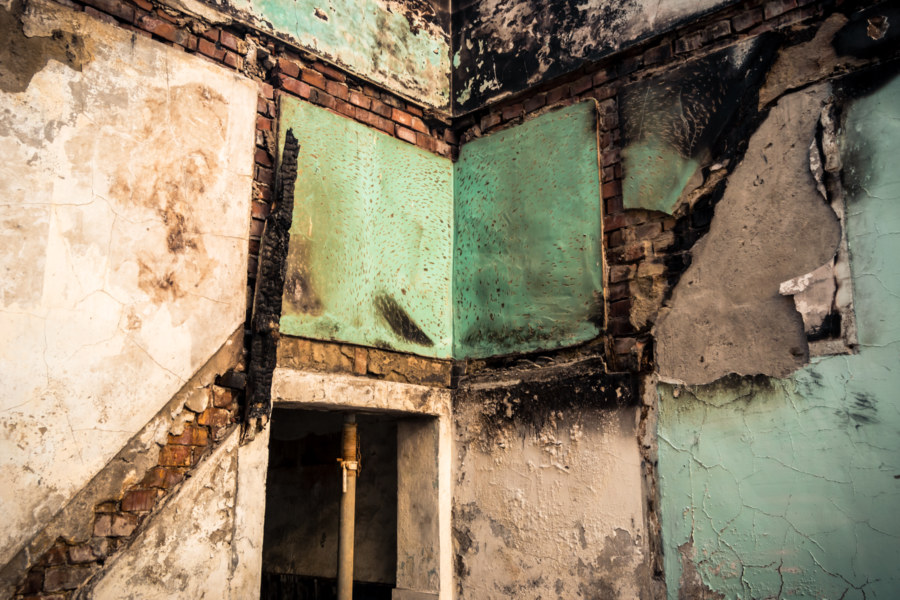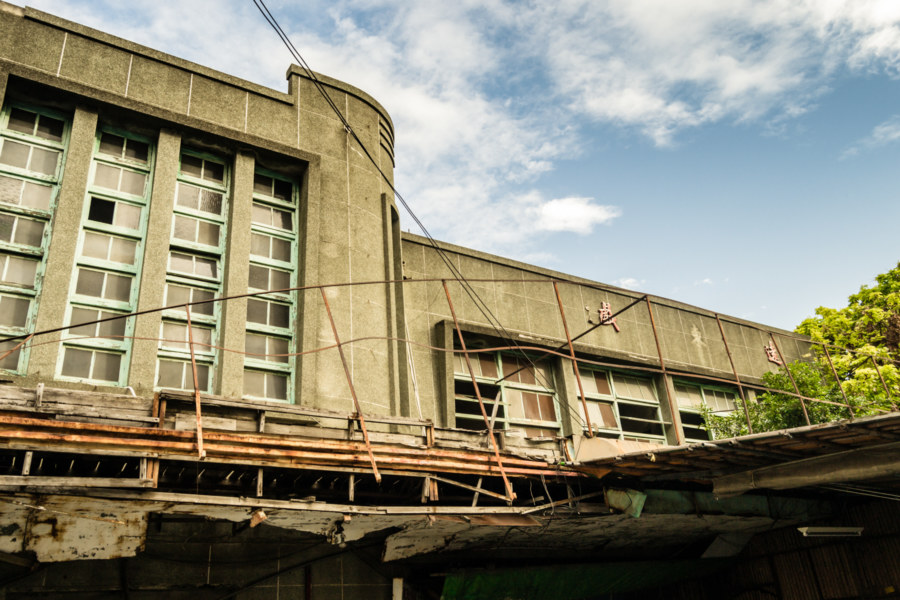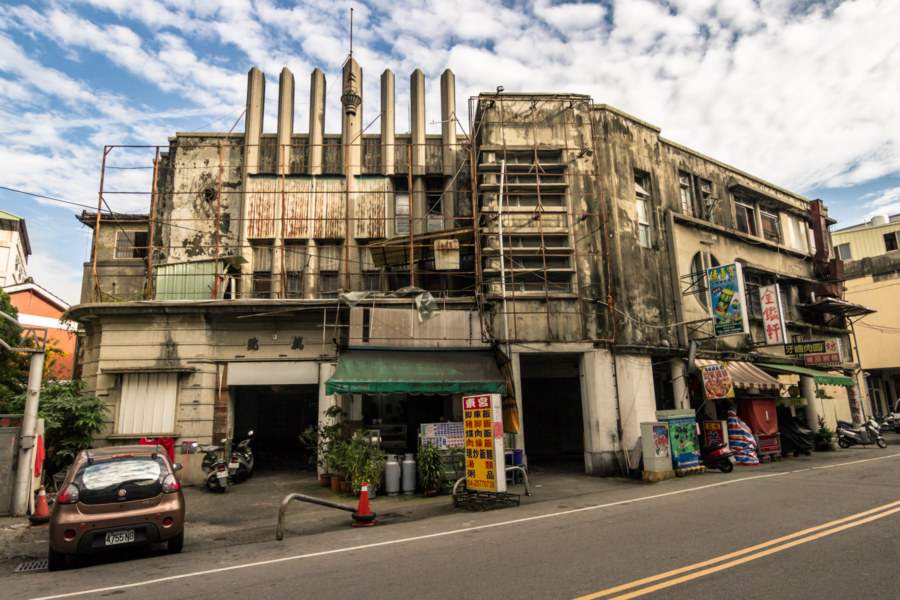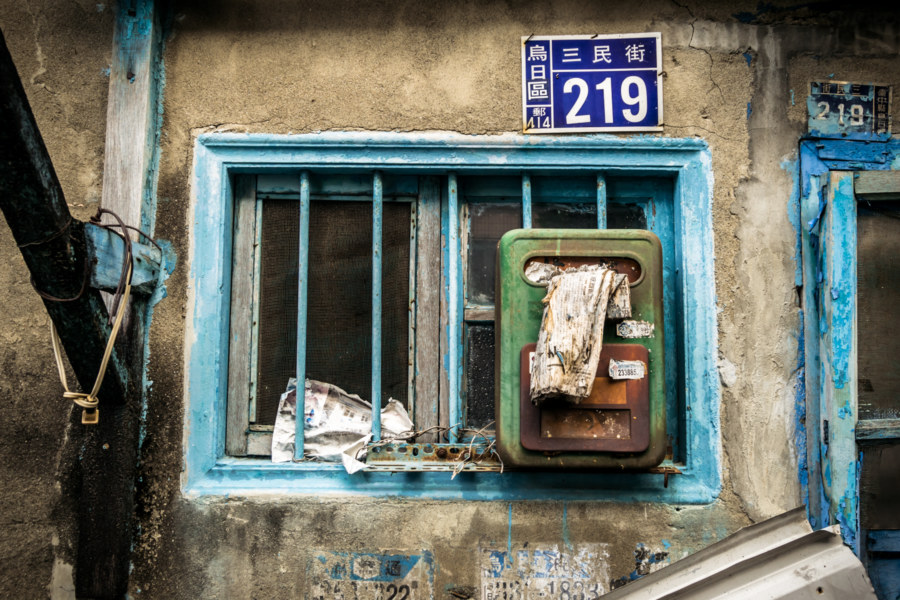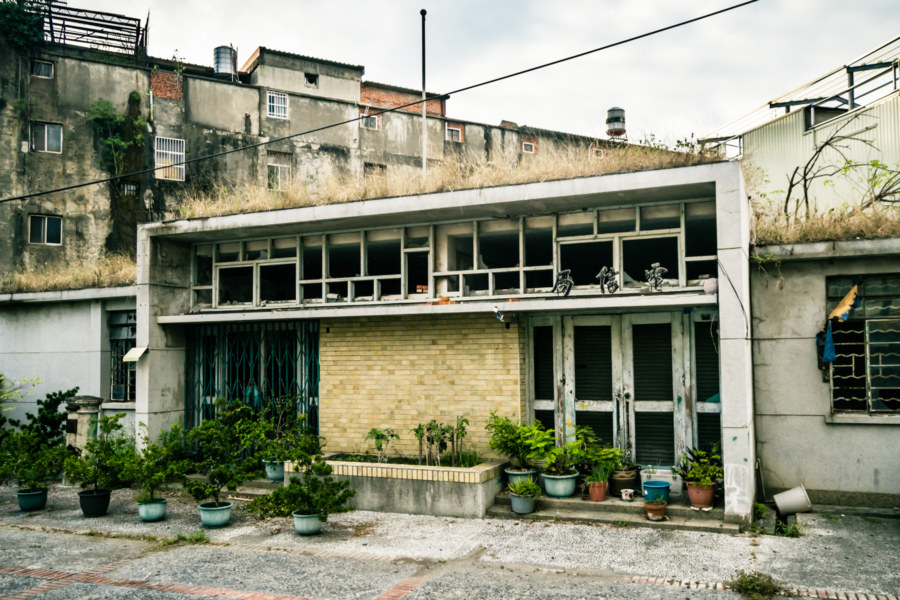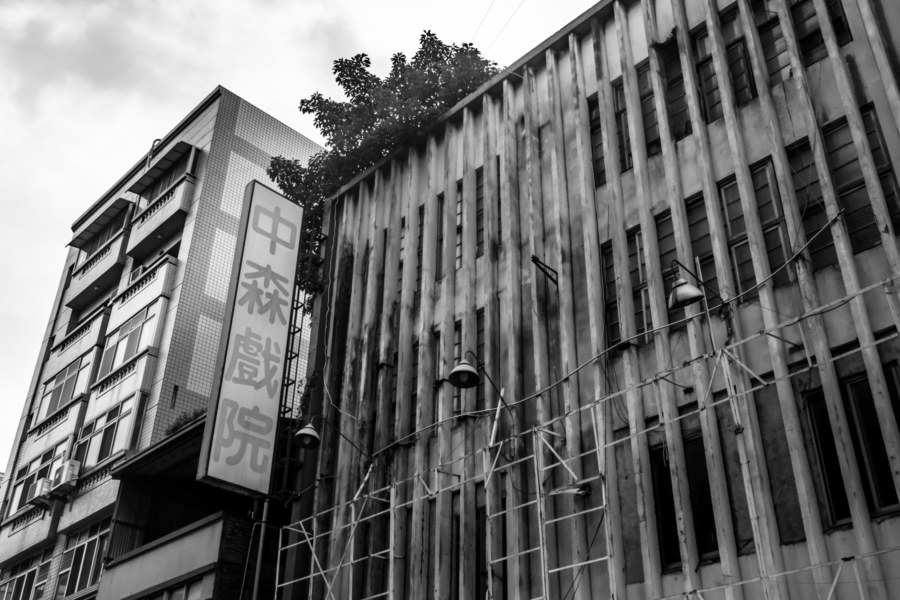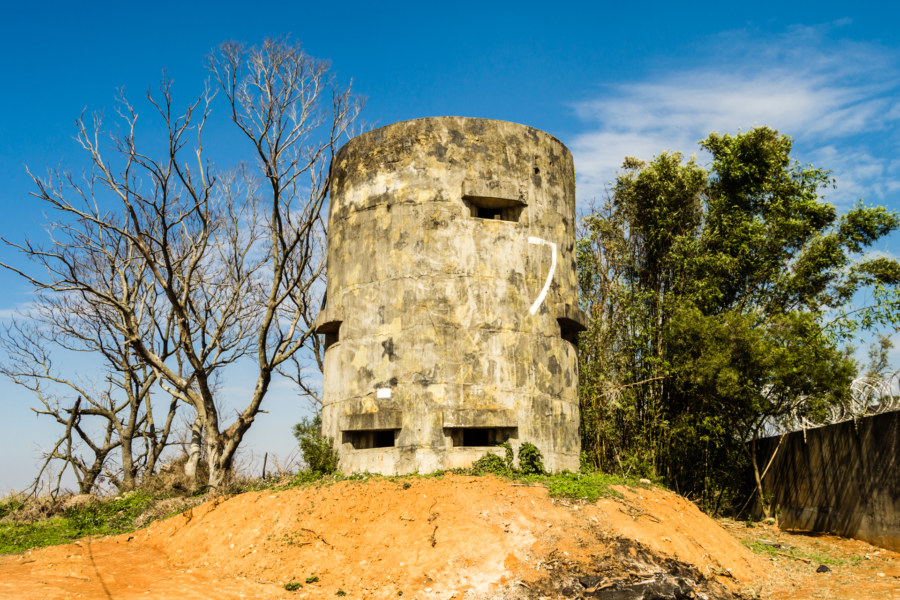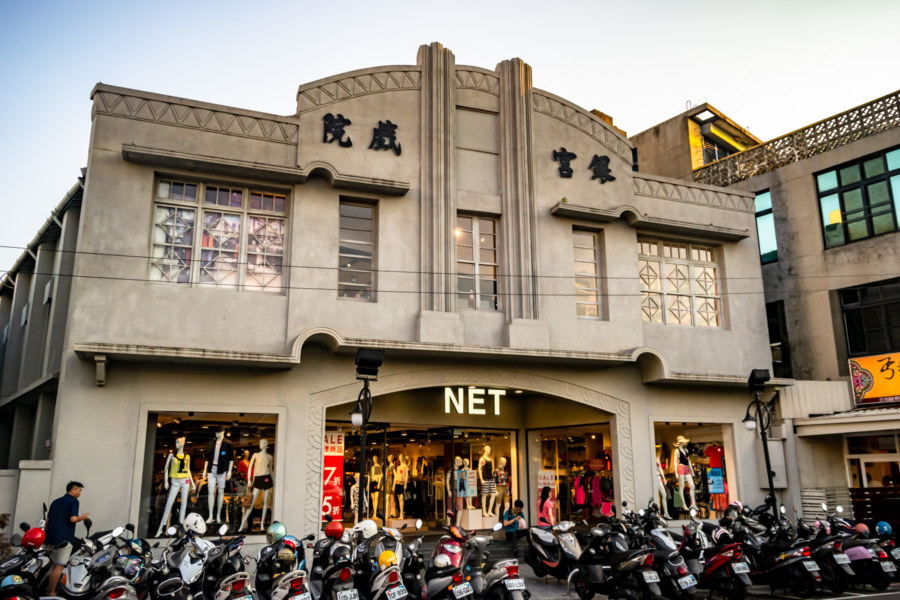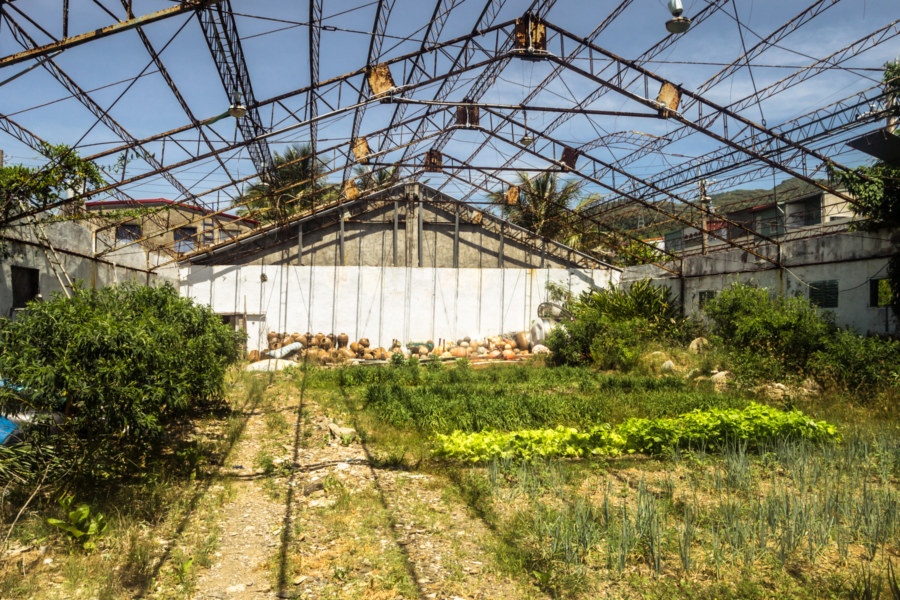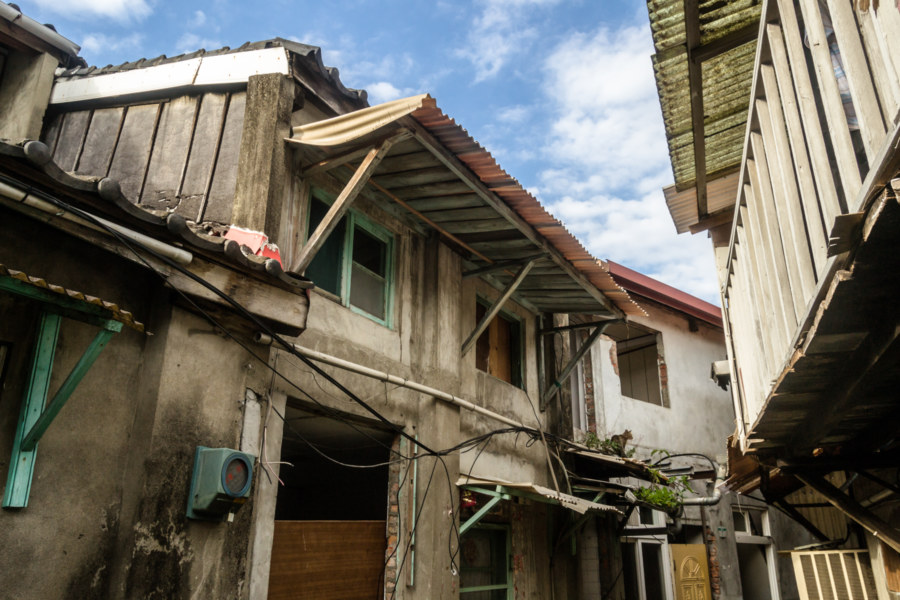The south side of central Taichung is undergoing massive changes with the opening of the new Taichung Station. Formerly one of the most rundown parts of urban Taiwan, it is now the front of the station, and many old and decrepit buildings like this house on Dàyǒng Street 大勇街 are being torn down to make way for lucrative new developments. It is a minor ruin, one for which I have uncovered no specific history, although a little sleuthing around on Google Street View indicates the building was still intact in February 2015 and boasted a simple signboard for a tea shop: 茶點複合式冷飲. Judging by the construction style I would guess this place dates back to the 1960s, give or take a decade. Gathered here are several photos shared more for their aesthetic appeal than intrinsic historic value.
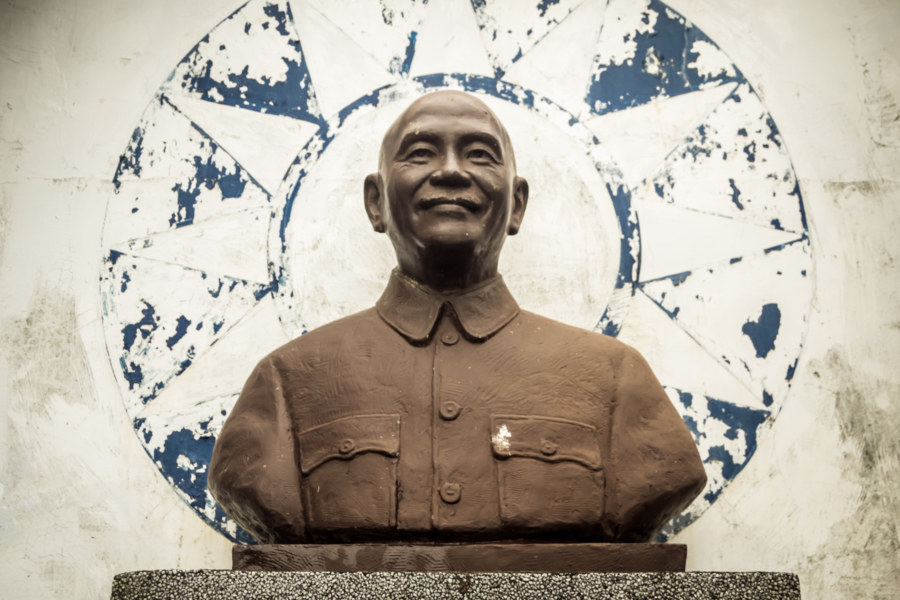
In the aftermath of World War II the Japanese authorities were expelled from Taiwan and the Kuomintang (KMT) invaded from China. Tensions between the local populace and the occupying force boiled over in the bloody February 28 Massacre in 1947, leading to the imposition of martial law and the beginning of the White Terror (白色恐怖) in 1949. For the purposes of this blog the time period from the end of the Japanese colonial era until the lifting of martial law in 1987 and its ultimate end in 1991 shall be referred to as the KMT authoritarian era.
Beidou Yuandong Theater 北斗遠東戲院
Beidou is home to the historic Yuǎndōng Theater (遠東戲院, literally “Far East Theater”), originally built in 1955. Like most vintage theaters in Taiwan it struggled through the home video era and eventually shut down in the late 1990s. Unlike many other cinemas of its generation it does not appear to have been subdivided into smaller theaters prior to going out of business. It was, however, converted for use as a karaoke bar or gambling den at some point, judging by what I observed on a recent visit. As of 2015 the interior is used for nothing more than storage, particularly for a restaurant that has since colonized the area adjacent to the former ticket booth and entrance.
Donggong Theater 東宮戲院
Dōnggōng Theater 東宮戲院 is located in Dongshi, a Hakka majority township in mountainous central Taichung. Dongshi (or Tungshih in the older Wade–Giles Romanization system) is the gateway to the densely forested interior and was a major center of the lumber industry in Taiwan prior to its decline in the late 1970s and early 1980s. Disaster struck in 1999 with the devastating 921 Earthquake. Dongshi was among the worst hit; over 300 people lost their lives and hundreds of buildings collapsed—but not this grand old theater.
Return to Sender
A vivid shade of blue adorns a derelict home in Wuri.
Yesterday I made a brief stop in Wuri to located and document the Japanese colonial era stationmaster residence. A metal fence has been erected outside the residence so I went for a walk around the perimeter to look for another point of entry. Along the way I passed several derelict and abandoned homes of a more recent vintage. These homes were constructed in a more provisional style common to the KMT authoritarian era and were probably built to house railway workers or military veterans and their dependents—but that’s just a guess. Whatever the case, I was momentarily transfixed by the vivid shade of blue on the trimmings of one of these modest homes and lined up a shot of the overstuffed mailbox worth sharing. You may also notice duplicate address plates which reminds me—I’d love to know when various versions of those plates entered into use in different districts.…
Xizhou Telecom Bureau 溪州原電信局
This week I visited the small town of Xizhou in southern Changhua to locate the eponymous Xizhou Theater. I found no way into the theater but made a serendipitous discovery while walking around the block in search of another access point. Across the street I noticed the utilitarian outline of the former Xizhou Telecom Bureau (溪州原電信局), a modest building that once housed a combined post office and service counter for the state phone company, then known as the [Directorate General of Telecommunications (交通部電信總局). The sign above the entrance simply reads Diànxìnjú (電信局), or “telecommunications bureau”, which is all anyone needed to know in those days. Taiwan’s telecom monopoly was broken up in 1996 with the privatization of what became known as Chunghwa Telecom (中華電信). In the absence of any sort of historic information about this obscure abandoned office I’d guess it was built sometime in the late 1970s or early 1980s.
Zhongsen Theater 中森戲院
Taichung is changing fast. The historic downtown area, formerly one of the worst examples of inner city blight in the nation, is presently undergoing a massive urban renewal effort. Some decaying and disused commercial buildings have been restored, many more await their fate, and others have been demolished before I’ve even had a chance to document their interiors. Zhōngsēn Theater 中森戲院 belongs to this last category: it came down after I shot a preliminary set of photos but before I had a chance to sneak inside. You have to move fast to capture these small histories in their unmaking.
Dadu Plateau Anti-Airborne Fortifications 大肚台地反空降堡
Dàdù Plateau (大肚台地) is a geographic feature of great strategic importance to the defense of central Taiwan. It overlooks the Qīngshuǐ Coastal Plain (清水平原) and occupies high ground on the far edge of the Taichung Basin (台中盆地), home to the majority of the population of Taichung, the third most populous metropolitan area in the nation. The entire length of the plateau is peppered with military facilities from the massive Ching Chuan Kang Air Base (空軍清泉崗基地) in the north to Chénggōng Ridge (成功嶺) down south. In between one will find a number of abandoned or disused bunkers, gun towers, and blockhouses. This post focuses on seven anti-airborne fortifications located in the central part of the plateau starting with the #7 Anti-Airborne Fort (七號反空降堡), my introduction to this cluster of ruins.
Yingong Theater 銀宮戲院
Despite living in Changhua City for half a year I never paid much attention to the clothing store across the street from the historic Confucius Temple 彰化孔子廟. At that time my Chinese abilities were rudimentary and I wasn’t really aware of what kinds of buildings to watch for while navigating the variegated urban landscapes of Taiwan. Only after encountering Datong Theater 大同戲院 in Taitung City did I become fascinated by the rise and fall of Taiwanese cinema. Since then I have mapped the locations of more than a hundred vintage theaters and documented many of their fates. Most end up abandoned or destroyed—but Yíngōng Theater 銀宮戲院 earned a new lease on life after it was purchased by NET, a Taiwanese fashion retailer.
Dawu Theater 大武戲院
I stumbled upon the remains of Dawu Theater 大武戲院 while on a bicycle tour of southern Taiwan in 2015. Located in the small town of Dawu, it was one of approximately 36 theaters operating in Taitung in the cinematic heyday of the 1960s and 70s, all of which are now abandoned or destroyed. This particular theater was in business from 1968 to 1983 and allegedly accommodated as many as 1,200 patrons, earning it the title of nánbàtiān 南霸天, or “southern tyrant”, for how it dominated the industry in the southernmost part of the county. Hardly anything remains after three decades of exposure that would identify Dawu Theater apart from a small sign in the antechamber.
Fushui Village 富水里
Fùshuǐ Village (富水里) is located on a small parcel of land at the southern edge of Zhongzheng, Taipei, just to the west of Gōnggǔan Station (公館站). Technically the village contains the now-abandoned Jiahe New Village (嘉禾新村), a military dependents’ village previously profiled on this blog, but most common uses of the name refer to the illegal settlement running along Yǒngchūn Street (永春街), just inside the riverside wall. This settlement of around a hundred homes, like nearby Treasure Hill (寶藏巖), was supposed to be destroyed around the turn of the millennium, but plans have gone awry, and its fate remains unclear.
